It always seems that someone somewhere has something new to say about The X-Files. Why is that? Part of its charm, and certainly the strength of its format, is that it is both one continuous story and a hundred little stories stitched together. Combine this with the millions of personalities in the fanbase, and it will transpire that there are many, many different ways of looking at The X-Files. And in the many, many lists of the best or scariest monsters from The X-Files, I have noticed a pattern emerging. It’s true that Tooms is iconic and the Peacock family is unforgettable, but for my list I have excluded them in favour of monsters (or pseudo-monsters—my definition is apt to be expansive) who better illustrate the show as I understand it.
The Ubermenscher – ‘Arcadia’
“Every community has its dark underbelly, don’t you think?”
– Agent Mulder
Season 6’s ‘Arcadia’ is a funny episode and one that I tend to rewatch for comfort, but behind the sunny exterior, it is downright sinister and at times brutally violent. There is as much real blood as there is motor oil. To anyone like myself who grew up in a diverse urban area, the idea of this caricatured community where everything looks the same is chilling in and of itself; lurking beneath the topsoil is something even more scary. Trash. That is to say, a huge trash monster summoned by the patriarch of a conformity cult. By bringing the concept of conformity to life in this monster, ‘Arcadia’ skewers the American dream of suburban homogeneity and heteronormativity.
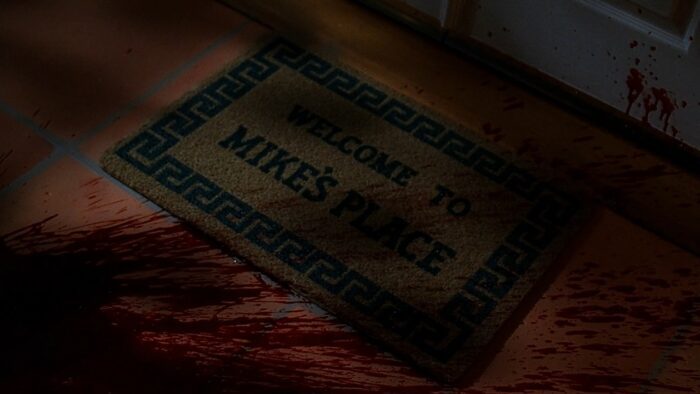
The aforementioned patriarch, Gogolack, cites his motive as simply that “it’s important that people fit in”; part of what appealed to me about The X-Files in the first place was the non-conformist attitudes of its protagonists, particularly Mulder. In the end, the Ubermenscher is discovered and defeated thanks to Mulder’s rule-breaking and loophole-finding.
The term ‘Übermensch’ comes from the writing of Friedrich Nietzsche, proposed as a figure that might enforce new values on the world following a shift away from Christianity. ‘Arcadia’ falls after ‘One Son’, in which the Syndicate crumbled like the Ubermenscher at our heroes’ feet, and not long before ‘Biogenesis’, where it’s not exactly ‘God is dead’ but ‘God is an alien’. The X-Files has by this point entered its own Nietzschian wasteland, where the things that gave the Myth Arc meaning have mostly dissipated. So what is the Ubermenscher? Perhaps it is a warning against synthetic moral values and autocracy, both in real life and in the story. When people are left to enforce their own values, the real world ends up with dictators, and Skinner ends up with nanobots in his bloodstream. No amount of nihilism is worth summoning a trash monster that bludgeons rule-breakers to death.
Greg Pincus – ‘Folie à Deux’
“People of America, a monster walks among you”
– Gary Lambert
As ‘Arcadia’ is to suburbia, ‘Folie à Deux’ is to the corporate world. In this Season 5 episode, company worker Gary Lambert is terrorised by his boss, Greg Pincus, who is secretly a giant soul-sucking insect. Well, we’ve all been there. Arguably, in this instance the literal monster of Pincus represents the metaphorical monster of capitalism. Furthermore, in the episode we learn that the same terror was previously inflicted on a church, perhaps representative of organised religion as a whole. Thus, while the monster is not a human, it is a metaphor for systems that humans have created.
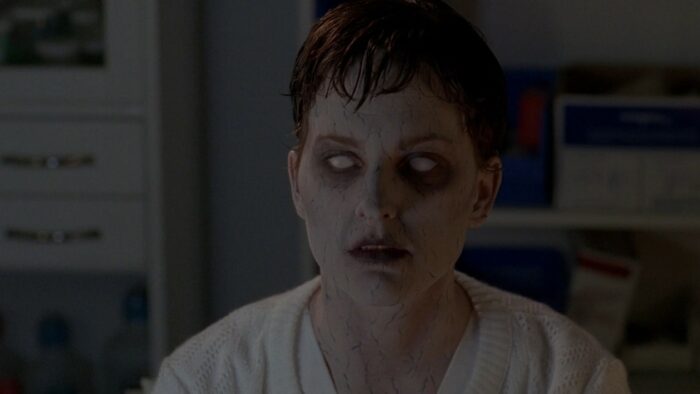
This episode has no connection to the Myth Arc, and yet has everything in common with it in the sense that both are about control by an authority figure. The way that Pincus turns people into “robots made out of meat” is not dissimilar from the threat of enslavement by an alien race, nor the control that the Syndicate has over the public and the FBI, as well as its employees. The villains of the conspiracy may be concealed by shadows, but they too are ‘hiding in the light’—the whole point is that public figures, up to and including the American government, cannot be trusted. The idea of a monster like Pincus who can hide in plain sight is a demonstration of the maxim “trust no one”.
Robert Patrick Modell – ‘Pusher’/’Kitsunegari’
“Haven’t you caught on, Mulder? They all kill themselves.”
– Robert Patrick Modell
Of all Vince Gilligan’s infamous human monsters—the ‘little men’ with cruel and violent fantasies—it is Robert Patrick Modell who has stuck in my mind as the absolute best (that is to say, the most monstrous). Otherwise known as Pusher, Modell has the ability to temporarily control people’s actions. Gilligan said that “losing control of yourself is a universal fear” and it is one that appears in many of his episodes—Pusher typifies this fear. One of his victims is fully aware that he is about to set himself on fire but is helpless to prevent it. His screams of “stop me” filled me with horror.
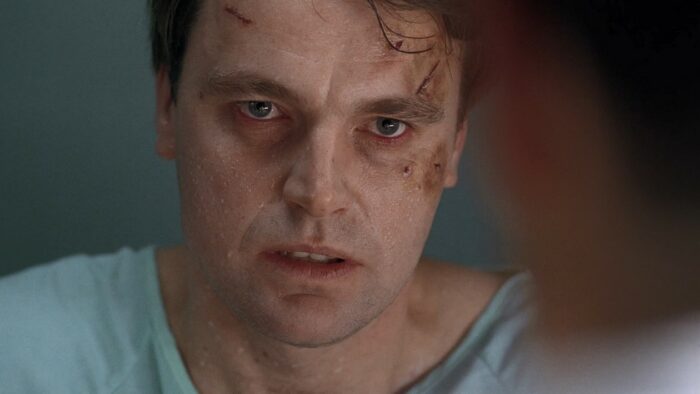
But lots of things in The X-Files are horrifying. What makes Modell worthy of a place on this list, aside from Wisden’s stellar performance, is his motive. Modell has decided that it is better to be evil than to be nothing at all, and he does what he does because he wants to go out in a “blaze of glory”. As a result, there is creativity to his obscene acts of cruelty. The idea or murder via a telepathic heart attack has a little more wicked finesse than the brute force of the Ubermenscher, for example. He is comparable to Moriarty, or the Joker, not least because of his yin and yang relationship with Mulder. Indeed, this is a case that Mulder takes very personally.
Aside from his obvious opposition to evil, Mulder’s hatred of Modell could be because of his specific ability. Modell made a particular shade of blue famous to X-Philes by making a police officer blind to an oncoming truck; in the (flawed but enjoyable) sequel episode ‘Kitsunegari’ a store clerk is ‘pushed’ by Modell to hallucinate that he is holding a snake. When Modell is around, it is very dangerous to believe. He manipulates reality for others—most of us consider our reality to be sacred, and (especially in this show) the truth is not something to be messed with. Fox ‘seeing is believing’ Mulder is blindsided by what he is pushed to see and do.
Phillip Padgett – ‘Milagro’
“To have love was to carry a vessel that could be lost or stolen or worse, spilled blood-red on the ground”
– Phillip Padgett (read by Agent Scully)
When we record things in writing, or learn poems ‘by heart’, we are experiencing the longstanding relationship between literature and human life, particularly the human heart. John Milton said that “books are not absolutely dead things”, and this is made apparent in one of the most intriguing and haunting episodes of The X-Files. The monster of ‘Milagro’ is a writer named Phillip Padgett, who commits murder using an alter ego, a character from his own novel. This episode alone requires several angles of interpretation; for a start there are the themes of the power of words and the responsibility of a writer over their creation. Then there is the way that Padgett’s dangerous obsession mirrors Mulder’s, because Mulder’s pursuit of the truth, like Padgett’s pursuit of Scully, results in deaths. I am interested in all of these, but most of all I am interested in how Padgett represents a conflict of dualism and materialism.
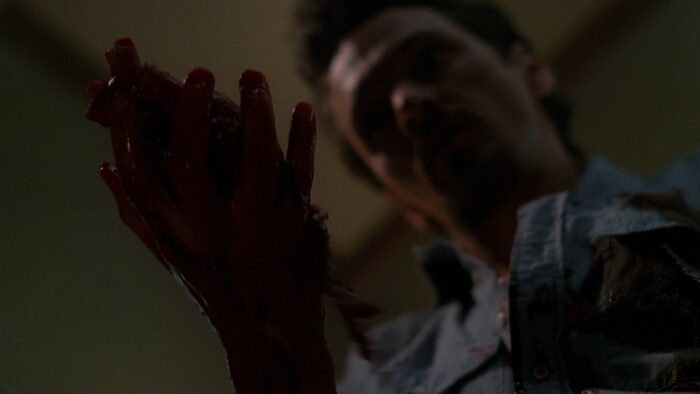
The fact that his alter ego, Ken Naciamento, exists as part of Padgett while being distinct from him (i.e. the two can exist independently to the point that they stand in the same room and argue with each other) encourages a dualist interpretation. In fact many episodes of The X-Files imply a ‘self’ that exists separately from the body (see: ghosts and astral projection). However ‘Milagro’ brings this romantic worldview crashing down. When Naciamento asks why it is he takes people’s hearts of all things, Padgett replies “I want to feel love”, because the heart remains the organ of love, even if modern science tells us the brain has more to do with it. It is a physical symbol of something intangible. As something of a skeptic myself, this is the paradox of The X-Files—that there is on the one hand the physical scientific world that can explain everything, including love, but there is also an instinct to believe in something greater, and that what exists between people is more than a couple of chemicals. But when Padgett holds a bleeding human heart in his hands, our perception of the heart is transformed before our eyes, from a sweet metaphor that adorns Valentine’s Day cards, to a perishable material object. We are left horribly vulnerable.
The Soul Eater – ‘The Gift’
“It took your death. You freed it.”
– Rustic Woman
There have been many variations of Philippa Foot’s famous Trolley Problem over the decades, but ‘The Gift’ might be the most disturbing of them all. As if being eaten alive and then regurgitated wasn’t unpleasant enough, this ‘monster’ wants us to face up to the flexibility of modern morality. This is the first entry on my list where I can confidently say that the monster—a being of Native American origin with the power to consume the sickness and pain of others—is not monstrous. I love this episode, because it brings out two themes: first, the question of whether an innocent should be made to suffer for the greater good; second, the concept of salvation and the portrayal of death as a ‘gift’.
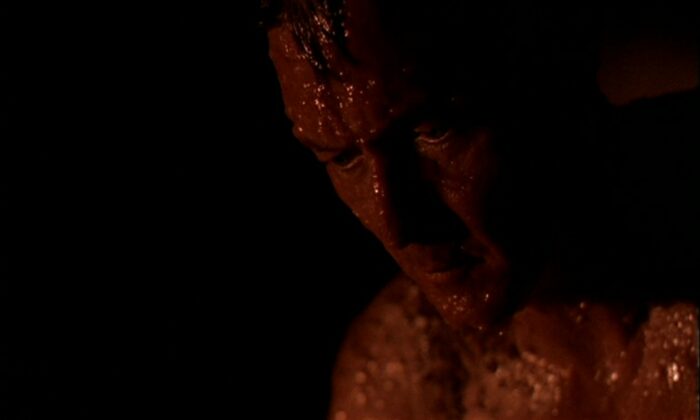
The needs of the many outweigh the needs of the few or the one…until a good man like John Doggett shows up. The residents of Squamash are pulling the lever in the Trolley Problem, as it were. But it is not exactly like the trolley problem, because the point is, they’re not killing the soul-eater; no, the soul-eater suffers immense pain and lives through all of it. This brings me round to my second point. In a nutshell, is the soul-eater’s fate worse than death?
When the soul-eater consumes Doggett’s death and finally dies himself, he achieves salvation from the suffering forced upon him, and his death is a relief. This presents a counterargument to Season 8’s desperate quest to bring Mulder back from the dead. ‘The Gift’ sits (just about) equidistant between ‘Requiem’ and ‘Existence’, and in both episodes characters talk about finding the “end” of Mulder’s quest. “It has to end some time”, Mulder says, shortly before his abduction and subsequent death do indeed bring an (albeit temporary) end to his quest and the suffering it caused him. To portray death as a gift is controversial but quintessential to many classical tragedies. Mulder, of course, comes back from the dead to face the thousand natural shocks anew. Meanwhile, the soul-eater may have found relief, but I was left full of sadness.
The Black Oil – ‘Apocrypha’, ‘Patient X’, etc.
“It’s been waiting 50 years down there for another host, another body to bring it up to the surface”
– Agent Mulder (‘Apocrypha’)
It’s slimy, it’s sentient, and it turns people into radioactive killing machines. It’s not a monster of the week but a monster of the decade, as the black oil (or “black cancer”, or “Purity, or ‘Oilien’) was practically synonymous with the mythology episodes in Season 3-6. The cruelty of the black oil is that it totally violates a person, and strips them of their autonomy, as it takes over their body and mind. In Elizabeth Hand’s novelisation of Fight the Future, the effects are briefly described as leaving one’s limbs “numb and frozen”.
If it feels any worse than it looks, it must be truly awful, because watching a person’s eyes turn black is chilling enough, and what comes later is downright horrifying. The scene in ‘Apocrypha’ that finds Alex Krycek heaving on all fours as the oil leaks from his mouth and eyes required Nicholas Lea to wear a mask complete with tubes and pumps: “a lot of it ended up getting in my mouth, so I ended up breathing through a straw for most of the afternoon. It was some kind of sugary, glucose, awful stuff” (Empire). In ‘Patient X’, Marita Covarrubias is cornered by a young boy who has picked the stitches out of his eyelids and is now leaking black oil. These scenes scared me so much that I could almost understand why the Tunguska bandits hacked off each others’ arms to avoid infection.
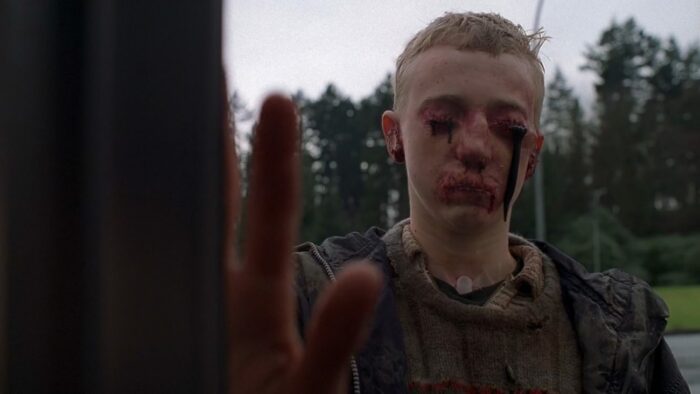
There are monsters on this list that are scary because they are human—Modell and Padgett are proof that evil is a human trait, and this frightens us because we have no immunity to being human. However, the black oil is evil precisely because it strips its victims of their humanity. The blessing is that evil in the shape of a man like Modell can be stopped by a bullet, however the black oil represents an evil that will not die at the death of its host, rather it will be passed from person to person, and sometimes lie dormant for thousands of years before resurfacing. This is an extrapersonal evil that makes the power of an FBI badge redundant. Thus, it is the perfect monster to expose the vulnerability of the human race, as all horror/science fiction surely strives to do.
Big Blue – ‘Quagmire’
“Scully, so many of the things we investigate are so intangible, but this creature, it exists within the specific earthly confines of this lake, and I want to find it”
– Agent Mulder
What’s older than the hills? What’s bigger than the sky? A legendary aquatic dinosaur that takes the seventh and final spot on my list, that’s what. Despite the fact that Big Blue only appears very briefly in the final scene of ‘Quagmire’, its reach and influence over the episode and the lives of the characters is paramount. What Big Blue represents is fundamental to Mulder’s “seek and ye shall find” worldview—finding “hope” in the possibility that extraordinary things exist, and that the world may be even more magical than it appears. ‘Quagmire’ also returns to themes that reoccur in the monster-of-the-week episodes—man’s encroachment on nature, and survival of the fittest—which are themselves quintessential to the concept of monsters. The idea that nature is fighting back makes monsters not of the denizens by which nature guards itself but of man. And then there is the perseverance of life, symbolised throughout The X-Files in so many (often tragic) ways; maybe this is the “hope” that Agent Mulder was referring to—that if a dinosaur can survive against the will of man then anything is possible.
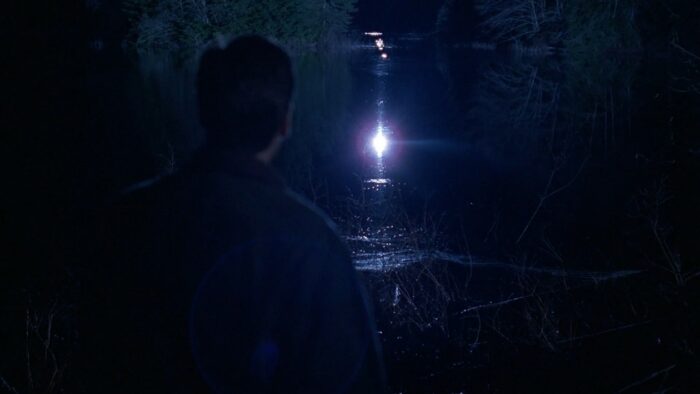
Big Blue may also go a long way to explain why 28 years later people still adore The X-Files. Has the show taken on a mythic status, like Big Blue? Well in my experience, kind of. So The X-Files isn’t quite as old as a dinosaur, but as a post-2000 baby I can certainly relate to having reverence for something that existed before I was born. I hear stories from my parents and friends about what it was like when the show first aired, and it begins to feel like I’m inheriting folk tales.As with the longstanding attraction of Big Blue, I am certain that mine is not the last generation that will be enchanted by The X-Files.
“There’s still hope. That’s why these myths and stories have endured. People want to believe”
– Agent Scully
The X-Files understands the inherited wisdom of its genre: not all monsters are evil, and not all evil looks like a monster. These have been my favourite examples of the many faces of The X-Files. Do you agree with my list? What monsters define The X-Files for you?

